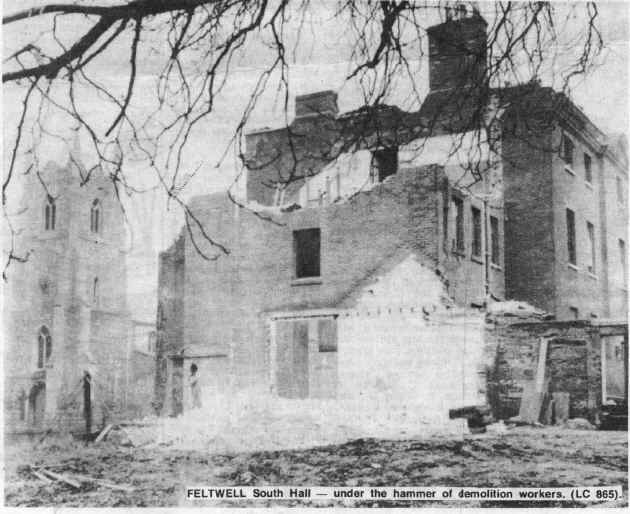 At the
beginning of this month, the demolition of Feltwell South Hall started to make
way for two dwellings.
At the
beginning of this month, the demolition of Feltwell South Hall started to make
way for two dwellings.
Mr A. J. Orange, Chairman of Feltwell Historical Society and
Mr P. Cooper, secretary, have researched into the history of this soon to
disappear land mark.
There were originally seven manors in the extensive village of Feltwell, they
tell us, and the hall was the major house of South Hall Manor.
Unfortunately, about 20 years ago, vast quantities of ancient
documents, including record books, were consumed in a huge bonfire so that the
history of the building itself is no longer available.
DIFFERENT NAMES
The hall appears to have been erected during the early
years of the 19th century, immediately in front of the former hall, which was
known by various names such as "Mott's House, "Wace's House" and
" The Tiled House".
The west wing was added by 1909 to provide bathrooms and
other rooms.
At the time of the Norman conquest the manor was owned by Alveva, a Saxon lady,
and later passed into the hands of the Cokefields. One of the Cokefield
family married William de Bellow Camps (or Beauchamp) and about 1297 it passed
to him.
By 1352 The Manor was in the hands of Sir John de Chyvereston
and in 1374 it was purchased by Lady Elizabeth Lutterell, widow of Sir Andrew
Lutterell. During the 15th and 16th centuries it appears to have been let
to the Motts and the Waces, but by 1564 it had passed to the Woodhouse family
who were Lords of the Manor for about 200 years.
LORDS OF THE MANOR
(Article 6 in Clough Family Loop)
In 1730 it was purchased by Mr Richard Brewster, of
Brandon and was let for about 40 years, before it came into the hands of the
Clough family, who were also Lords of the chief manor.
When Miss Pleasance Clough died in 1851, she left South Hall
Manor to her nephew, Edward Clough Newcome. On the death of his son Edward
Cyrill Newcome, whose widow continued to live in the Hall until her death in
1949, the lordship of the Manor passed to his nephew, Cyrill Henry Newcome
Harding.
After the death at the age of 90 of Mrs Newcome, the hall was
unoccupied until it was purchased by Weasenham Farms Company, who at one time
used it as a hostel for displaced persons and later for farming students.
It was sold about two years ago to the present developers. (End of the
Clough Family Loop - Click
to rejoin the tour)
Lynn News & Advertise 25/1/1978
I suspect this was marking "10 Years Ago" which means the Hall was demolished in 1968.
Back to Written Records or Infoloops